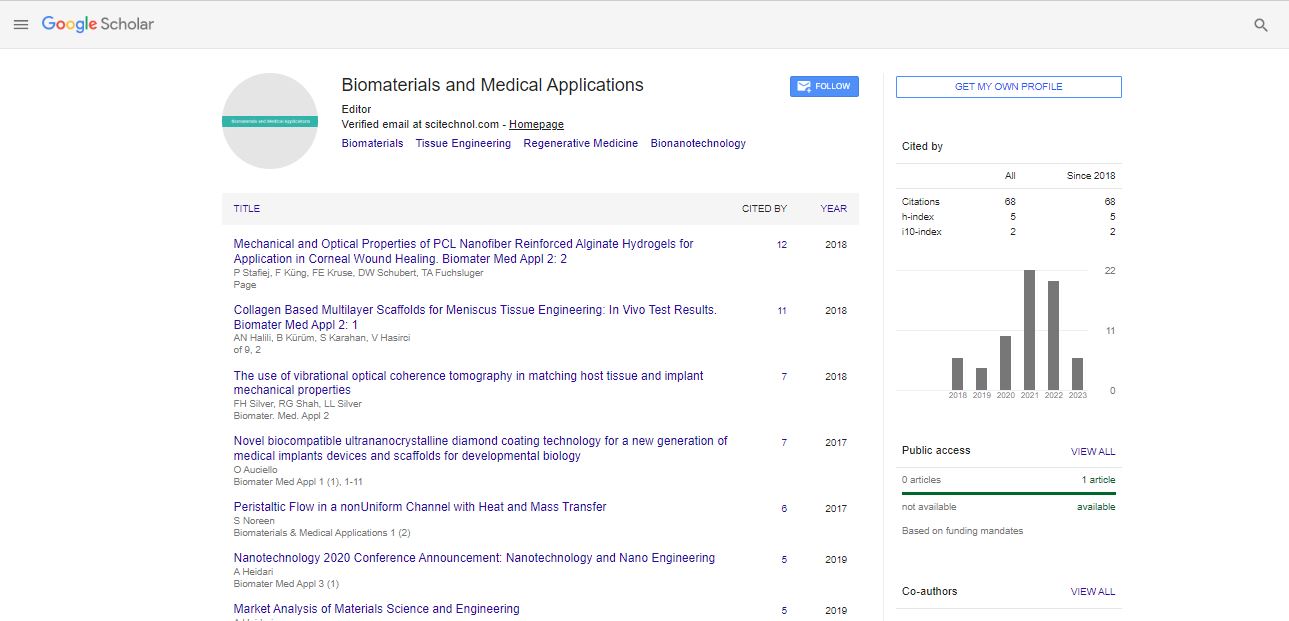The effect of pore structure of collagen scaffold on cultured human chondrocytes in cartilage tissue engineering
Mahdi Hadi
Tofigh Daru Research & Engineering Company, Iran
: Biomater Med Appl
Abstract
Statement of the Problem: One of the most important problems in humans is damage to the cartilage of the joints. Of the common case which affects most people of different ages is osteoarthritis that is due to the loss of the articular cartilage of the knee that in most cases, the subchondral bones in the cartilage subcutaneous are also damaged. These lesions are not thoroughly curable due to the limited repair power in the normal cartilage because of absence of lymph, vascular and nerve tissue. One of the newest remedies for cartilage treatment is making autologous cartilage in vitro and linking it to the patients joint. By using tissue engineering methods, one can design a biocompatible scaffold, using natural protein and seed it to the patient’s autologous chondrocyte cells and produce living human tissue. The purpose of this study is comparison of different methods in the freeze-drying process of designing and constructing an appropriate bio-scaffold with effective porosity size and shape, so that the highest efficiency required for the implantation and proliferation in the scaffold is created. Method: During a study, identical collagen hydro gels and different scaffolds were prepared by different conditions of freeze drying. Then, the patient’s cartilage was biopsied in accordance with ethical principles and chondrocyte cells were extracted and multiplied from the tissue. The cells were then placed adjacent to the scaffolds and cartilage tissues of different qualities were prepared in a month. Findings: After performing specialized tests related to cartilage tissue, the scaffold which had a freeze drying that reached -40 °C over a 90 minutes ambient temperature manifested the best cartilage tissue formation compared to the other groups. Conclusion: Human cells in the form of three-dimensional tissues in the scaffolds, be prepared with physical and chemical conditions in vitro and lead to fabrication of living human cartilage tissues and be used in treatment of diseases associated with cartilage damage.
Biography
Mahdi Hadi is currently working as Biological Medicines Director at Tofigh Daru Research & Engineering Company in Tehran and is engaged in developing advanced bio-based pharmaceuticals complying with GMP requirements. He has been involved in stem cell and tissue engineering in research and industrial centers of Iran for 12 years. He has worked as a Researcher at Royan Institute, Tehran. He has worked as the Project Manager of Cell Therapy Medicines Production and Tissue Engineering.
E-mail: Mahdi.hadi@ymail.com
 Spanish
Spanish  Chinese
Chinese  Russian
Russian  German
German  French
French  Japanese
Japanese  Portuguese
Portuguese  Hindi
Hindi 